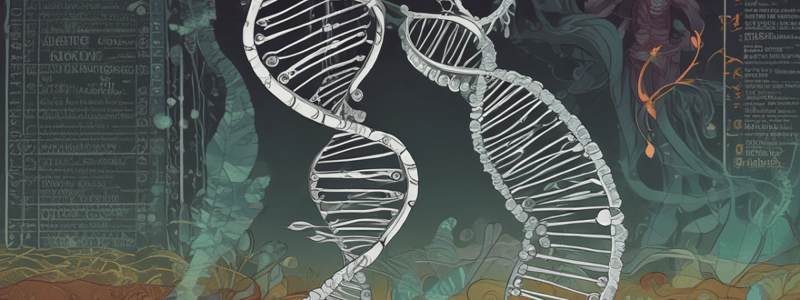Podcast
Questions and Answers
What type of mutation can result in a 'stop' codon, shortening the encoded protein?
What type of mutation can result in a 'stop' codon, shortening the encoded protein?
- Frameshift mutation
- Point mutation
- Nonsense mutation (correct)
- Triplet repeat
Which type of radiation is most likely to damage tissues and cause harm to health?
Which type of radiation is most likely to damage tissues and cause harm to health?
- Gamma radiation (correct)
- Beta radiation
- Alpha radiation
- Ultraviolet radiation
What type of mutation can result in a change in the reading frame of the genetic code?
What type of mutation can result in a change in the reading frame of the genetic code?
- Point mutation
- Chromosomal mutation
- Frameshift mutation (correct)
- Triplet repeat
What is the result of a mutation that causes a premature stop codon in the gene that codes for the low density lipoprotein (LDL) receptor?
What is the result of a mutation that causes a premature stop codon in the gene that codes for the low density lipoprotein (LDL) receptor?
What is an example of a visible mutation in humans?
What is an example of a visible mutation in humans?
Flashcards are hidden until you start studying
Study Notes
Mutations Defined
- A mutation is a change in a DNA base-pair or a chromosome.
- There are two types of mutations: somatic mutations (affect only the individual) and germ-line mutations (alter gametes, affecting the next generation).
Types of Mutations
- Point mutations: a change in a single DNA base-pair.
- Base pair substitutions: silent, missense (new protein), or nonsense (stop codon).
- Base pair insertions and deletions: frameshift mutations.
- Triplet repeats: deletion or duplication of a codon.
Examples of Mutations
- Sickle cell disease: a missense mutation that changes the DNA sequence from CTC to CAC, encoding valine instead of glutamic acid.
- Factor XI deficiency: a nonsense mutation that changes the codon from GAA to UAA, signifying "stop".
- Gaucher disease: an insertion mutation that adds a single DNA base, preventing production of an enzyme.
- Cystic fibrosis: a triplet repeat mutation that deletes a codon, causing a deletion of phenylalanine.
Classification of Point Mutations
- Forward mutations: change the genotype from wild-type to mutant.
- Reverse mutations (reversions or back mutations): change the genotype from mutant to wild-type or partially wild-type.
Spontaneous and Induced Mutations
- Spontaneous mutations: occur naturally, without an external cause.
- Induced mutations: occur due to intentional or accidental exposure to mutagens (chemicals or radiation).
Induced Mutations
- Intentional use of mutagens: chemicals or radiation are used to induce mutations.
- Accidental exposures to mutagens: exposure to mutagens through accident or environmental factors.
- Natural exposure to mutagens: exposure to ionizing radiation from natural sources (e.g. uranium, radium).
Ionizing Radiation
- Alpha radiation: least energetic and most short-lived, absorbed by the skin.
- Beta radiation: more penetrating, emitters include tritium, carbon-14, and strontium-70.
- Gamma radiation: most penetrating, emitters include plutonium and cesium isotopes, used to kill cancer cells.
How Mutations Cause Diseases
- Familial hypercholesterolemia (FH): an example of incomplete dominance in humans, caused by a mutation in the LDL receptor gene.
- The severity of the disease depends on the number of disease-causing alleles.
Exploring Mutations
- Visible mutations: affect the appearance of an organism, such as human phenotypes, Drosophila eyes or wing-shape, coat color in animals, colony size in yeast, or plaque morphology of phages.
Studying That Suits You
Use AI to generate personalized quizzes and flashcards to suit your learning preferences.




